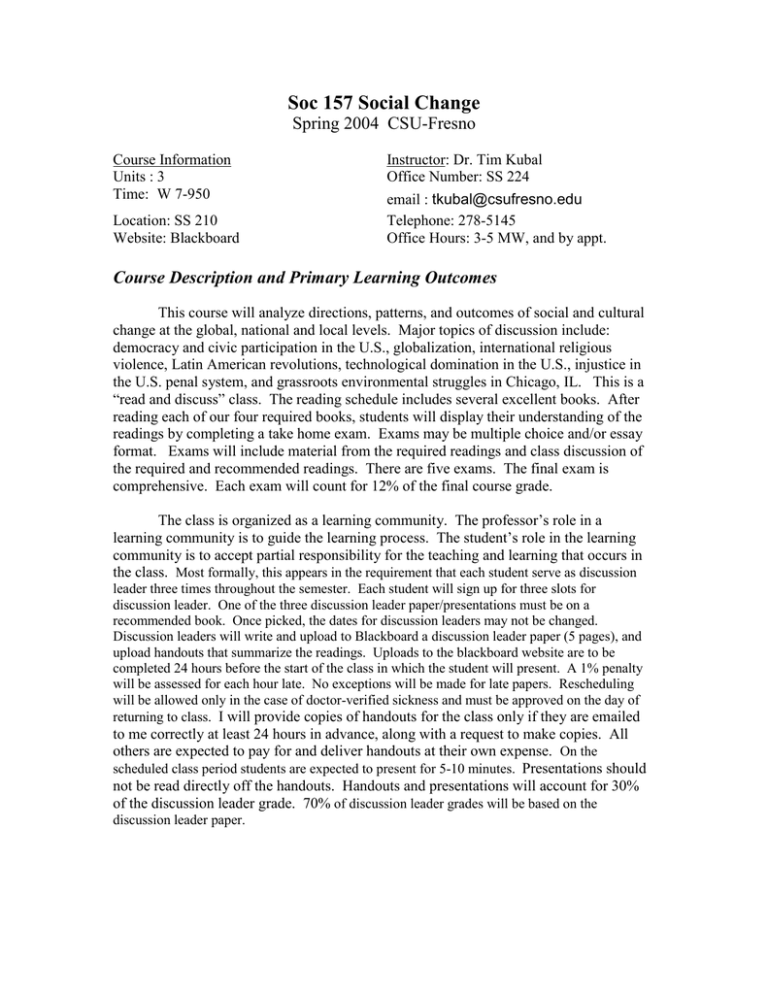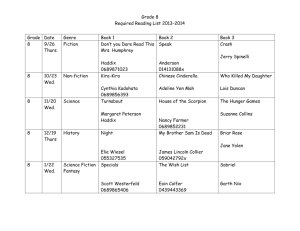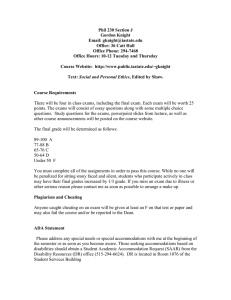Soc 157 Social Change Spring 2004 CSU-Fresno
advertisement

Soc 157 Social Change Spring 2004 CSU-Fresno Course Information Units : 3 Time: W 7-950 Location: SS 210 Website: Blackboard Instructor: Dr. Tim Kubal Office Number: SS 224 email : tkubal@csufresno.edu Telephone: 278-5145 Office Hours: 3-5 MW, and by appt. Course Description and Primary Learning Outcomes This course will analyze directions, patterns, and outcomes of social and cultural change at the global, national and local levels. Major topics of discussion include: democracy and civic participation in the U.S., globalization, international religious violence, Latin American revolutions, technological domination in the U.S., injustice in the U.S. penal system, and grassroots environmental struggles in Chicago, IL. This is a “read and discuss” class. The reading schedule includes several excellent books. After reading each of our four required books, students will display their understanding of the readings by completing a take home exam. Exams may be multiple choice and/or essay format. Exams will include material from the required readings and class discussion of the required and recommended readings. There are five exams. The final exam is comprehensive. Each exam will count for 12% of the final course grade. The class is organized as a learning community. The professor’s role in a learning community is to guide the learning process. The student’s role in the learning community is to accept partial responsibility for the teaching and learning that occurs in the class. Most formally, this appears in the requirement that each student serve as discussion leader three times throughout the semester. Each student will sign up for three slots for discussion leader. One of the three discussion leader paper/presentations must be on a recommended book. Once picked, the dates for discussion leaders may not be changed. Discussion leaders will write and upload to Blackboard a discussion leader paper (5 pages), and upload handouts that summarize the readings. Uploads to the blackboard website are to be completed 24 hours before the start of the class in which the student will present. A 1% penalty will be assessed for each hour late. No exceptions will be made for late papers. Rescheduling will be allowed only in the case of doctor-verified sickness and must be approved on the day of returning to class. I will provide copies of handouts for the class only if they are emailed to me correctly at least 24 hours in advance, along with a request to make copies. All others are expected to pay for and deliver handouts at their own expense. On the scheduled class period students are expected to present for 5-10 minutes. Presentations should not be read directly off the handouts. Handouts and presentations will account for 30% of the discussion leader grade. 70% of discussion leader grades will be based on the discussion leader paper. Course Description and Primary Learning Outcomes, continued The discussion leader paper should: 1) summarize the readings, 2) compare/contrast to one sociological journal article on the topic (must be a journal article found in Sociological Abstracts), 3) critique the readings, 4) apply the material to real-world events by using at least three current newspaper articles (articles must be within the last 4 years and must be found in Lexus/Nexus), and 5) wonder about the readings. 30% of the total course grade will be based on three performances in the role of discussion leader (10% each). Students not presenting also have an important role to play – engaging the presenter and participating in discussion of the assigned readings. It is safe to say that each student should come to each class with at least one thoughtful comment or question about the readings. Behave as you would in a job or profession where it pays to act as if you are enthused. In the workplace, the people that the boss notices get the promotions. In this course, it is your responsibility to get yourself noticed as someone who attends class regularly, who has read the course material, thought about it seriously, and who has been generous about sharing your questions and insights with the rest of the class. The professor may offer short assignments throughout the semester to evaluate a portion of the participation grade. 10% of the course grade will evaluate participation throughout the semester. Grading Exams (12% each) Discussion Leader Paper/Presentation (10% each) Class Participation 60% 30% 10% Required Readings Pellow, David. 2002. Garbage Wars: The Struggle for Environmental Justice in Chicago. MIT Press. Beckett, Katherine and Sasson, Theodore. 2004. The Politics of Injustice: Crime and Punishment in America, 2nd ed. Sage Press. Juergensmeyer, Mark. 2003. Terror in the Mind of God: The Global Rise of Religious Violence. University of California Press. Schaeffer, Richard. 2003. Understanding Globalization: The Social Consequences of Political, Economic, and Environmental Change, 2nd ed. R&L Press. Recommended Readings Skocpol, Theda. 2003. Diminished Democracy: From Membership to Management in American Civic Life. University of Oklahoma Press. Kay, Jane. 1997. Asphalt Nation: How the Automobile Took Over America and How We Can Take It Back. University of California Press. Guillen, Mario. 2001. The Limits of Convergence: Globalization and Organizational Change in Argentina, South Korea, and Spain. Princeton University Press. Paige, Jeffery. 1998. Coffee and Power: Revolution and the Rise of Democracy in Central America. Harvard University Press. Grading Exams (12% each) Discussion Leader Paper/Presentation (10% each) Class Participation 60% 30% 10% Details Students are responsible for meeting the deadlines posted in the course calendar (below). Grades for late submissions of take-home exams will be lowered by 25% per class period. Without a valid excuse, no other assignments will be accepted late. Only those that have provided a valid, documented excuse (illness of self or child, death in immediate family, and official university travel) will be given an extension without penalty (length to be determined by the professor). I do take attendance. I expect you to complete the reading assignment before class, arrive to each class on time, avoid distractions (chatting, newspapers, cell phones, etc are inappropriate), and remain engaged with the class material until dismissed. Student conduct that disrupts the learning process shall not be tolerated and may lead to disciplinary action and/or removal from class. The classroom is a special environment in which students and faculty come together to promote learning and growth. It is essential to this learning environment that respect be maintained for the rights of other learners and teachers in the classroom. Differences of viewpoint or concerns should be expressed in terms which are supportive of the learning process, creating an environment in which students and faculty may learn to reason with clarity and compassion, to share of themselves without losing their identities, and to develop and understanding of the community in which they live. The University Policy on Disruptive Classroom Behavior (APM 419) will be followed. It can be found in the Schedule of Courses and the Academic Policy Manual. Cheating will not be tolerated. Cheating is the actual or attempted practice of fraudulent or deceptive acts for the purpose of improving one's grade or obtaining course credit; such acts also include assisting another student to do so. Typically, such acts occur in relation to examinations. However, it is the intent of this definition that the term 'cheating' not be limited to examination situations only, but that it include any and all actions by a student that are intended to gain an unearned academic advantage by fraudulent or deceptive means. Plagiarism is a specific form of cheating that consists of the misuse of the published and/or unpublished works of others by misrepresenting authorship of part or all the material. All papers must contain full citations; neither ignorance nor carelessness will serve as valid excuses for plagiarism. Careful use of grammar and citations usually diffuses most unintended cases of plagiarism. Students may not work together on exams, discussion papers, or research. I can and will check papers for plagiarism with turnitin.com and other plagiarism detection services. Students are encouraged to carefully check their work for such errors. Penalties for cheating and plagiarism range from an F on a particular assignment, through an F for the course, to expulsion from the university. For more information on the University's policy regarding cheating and plagiarism, refer to the Schedule of Courses (Legal Notices on Cheating and Plagiarism) or the University Catalog (Policies and Regulations). Students with disabilities must contact the instructor in the first two weeks of class. All reasonable accommodations will be made. For more information, contact Services to Students with Disabilities in Madden Library 1049 (278-2811). This syllabus is subject to change in extenuating circumstances. Students are responsible for obtaining from other class members the class notes and announcements made in class while they were absent. If students are unclear after consulting with classmates, then they may consult the instructor during office hours for clarification. Computers and communications links to remote resources are recognized as being integral to the education and research experience. Every student is required to have his/her own computer or have other personal access to a workstation (including a modem and a printer) with all the recommended software. The minimum and recommended standards for the workstations and software, which may vary by academic major, are updated periodically and are available from Information Technology Services (http://www/csufresno.edu/ITS/) or the University Bookstore. All written assignments must be turned in with Microsoft Word for Windows. A Broadband - DSL or Cable - connection is recommended. Efforts will be made to accommodate slower connections. Alternative locations such as school labs connection should be considered. Problems with technology or Blackboard should be directed to Digital Campus. Course Schedule Date 1 Wed, Jan 28 2 Wed, Feb 4 3 Wed, Feb 11 Topic Course Introduction Garbage Wars Garbage Wars 4 Wed, Feb 18 5 Wed, Feb 25 6 Wed, Mar 3 Politics of Injustice Politics of Injustice *Diminished Democracy 7 Wed, Mar 10 8 Wed, Mar 17 9 Wed, Mar 24 Wed, Mar 31 Wed, Apr 7 *Asphalt Nation Terror in the Mind of God Terror in the Mind of God Cesar Chavez Holiday Spring Break 10 Wed, Apr 14 11 Wed, Apr 21 12 Wed, Apr 29 13 Wed, May 5 Understanding Globalization Understanding Globalization Understanding Globalization *Limits of Convergence 14 Wed, May 12 *Coffee and Power Final Exam Preparation & Faculty Consultation Days: Final Semester Examinations Final Exam in this course * Recommended books Reading Assignment None Pp.1-80 Pp.80-169 Pp.1-101 **Exam 1 Due Pp.103-204 Whole Book Whole Book **Exam 2 Due Pp.3-118 Pp.121-249 Pp.1-113 **Exam 3 Due Pp.119-246 Pp.251-360 Whole Book Whole Book **Exam 4 Due Thursday and Friday Monday-Thursday May 13-14 May 17-20 Wednesday May 19 8-10pm



